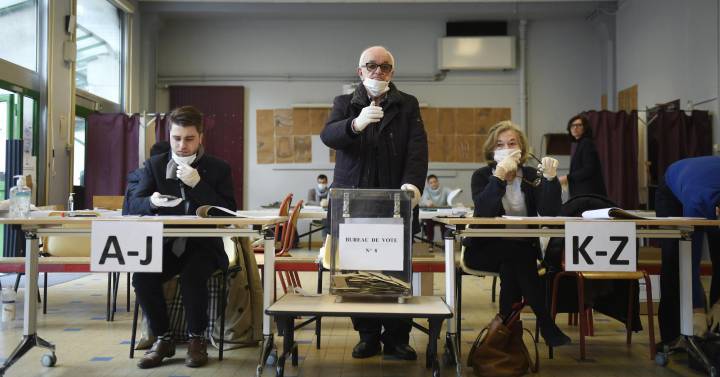The coronavirus has completely changed our routines and agendas. You can telework, also attend online classes, even exercise, if there is enough will. But there are many other tasks and activities that cannot be done at home and one of them is voting - although there are several experiences of electronic and remote voting. Whether for this reason or because of the risks - health and reputational - of organizing elections during a pandemic, many campaigns and elections are being suspended, postponed or affected. The electoral calendar tests positive for coronaviruses.
Some electoral appointments have been suspended or postponed, such as the Basque and Galician, the British local, the Democratic primaries in six states, the second round of the French municipal elections - which were scheduled for this Sunday - and the Chilean constitutional plebiscite, which has passed from April 26 to October 25. The coronavirus sets the pace and postpones the political game, changing priorities and urgencies. These changes in electoral calendars are, without a doubt, complex decisions, with institutional and political consequences, some still unknown and unpredictable; and they have long, wide and deep debates behind them. In general, they are unanimous decisions, supported and backed by their own and others, a sample of the possible and desirable consensus in times of crisis. In all cases, faced with different realities and strategies, common sense prevails: a campaign is not compatible with confinement.
Other elections, on the other hand, have taken place as planned (or almost), such as, for example, the parliamentary elections in Iran and Israel, the Dominican municipal elections that were held last Sunday or the first round of municipal elections in France. In the latter case, the result was far from expected: participation fell 20 points. The reassuring messages from the Minister of the Interior and the strict instructions on health protection were not enough. He gained pandemic stress and confusion in the face of inconsistency and conflicting discourses.
Lastly, there is a group of ongoing campaigns for elections that are still scheduled, such as the parliamentary ones in South Korea, the expected presidential ones in Bolivia and the North American presidential ones, although not without difficulties and affectations in the primary process. What to expect What are campaigns and elections like in times of coronavirus?
The pandemic will also test our democracies and our values
1. An organizational challenge. The coronavirus can also cause electoral coordination and organization problems due to "fear of being in public spaces" as happened in California, while in Israel they set up special tables so that quarantined people could vote and in France "water points" were installed for workers and voters to keep their hands clean. If the election days are already complex events, the health crisis forces the electoral authorities to reinforce controls, take extraordinary measures and prepare for unforeseen events. Vote with gloves and masks: the ballot boxes in the UVI.
2. Towards electronic voting. "How long does the coronavirus last in the saliva of an envelope?" Asked the Washington secretary of state. There are experts who suggest changing this and other practices, such as the safe distance in the voter lines or the protection of those who open the envelopes. However, this change in habits is not likely to be immediate and will reignite debates about electronic and remote voting systems. From telecommuting to televoting .
3. From infodemic to dirty campaign. The WHO has been warning for weeks about the infodemic , the spread of fake news , rumors and hate speech. Misinformation about the coronavirus may mutate into a dirty campaign strategy, as it is feared will happen in the United States. Ayatollah Ali Khamenei also denounced "negative propaganda" in the Iranian parliamentarians. Xenophobic rejection of some minorities —or self-exclusion— and phobic reaction towards some people (simply by a sneeze) can cause significant changes in rights.
4. The technopolitical alternative. In the United States, the coronavirus entered fully into the campaign. The candidates have considerably lowered their level of activity; Biden and Sanders, for example, canceled rallies in Cleveland and Ohio. And there are other campaign actions, such as the exits to territory and the known door-to-door ( canvassing , in English), which could also be affected. The solution may be technopolitics.
5. Danger: abstention. Fear of exposure to contagion can negatively affect electoral mobilization and participation. It happened in Iran, where the elections were the least attended since the 1979 revolution, and in Paris, which had 56% abstention, 20 points more than in 2014, but not in Israel, which registered record participation.
6. Undecided, but pragmatic. In a context of uncertainty like the current one, undecided voters may tend to prefer to maintain the status quo , for fear that changes in government will hinder the management of the health crisis or the necessary containment measures in view of the expected cooling of the economy. This tendency to stability and pragmatism may favor officialdom.
The coronavirus will modify many consensus on crisis management and communication. There are no recipes or magic solutions. In this scenario, the campaigns —from their organization to their development— will demand the commitment and responsibility of the political parties and candidates. The pandemic will also test our democracies and our values.
Antoni Gutiérrez-Rubí is a communication advisor. @antonigr
You can follow EL PAÍS Opinion on Facebook, Twitter or subscribe here to the Newsletter.

